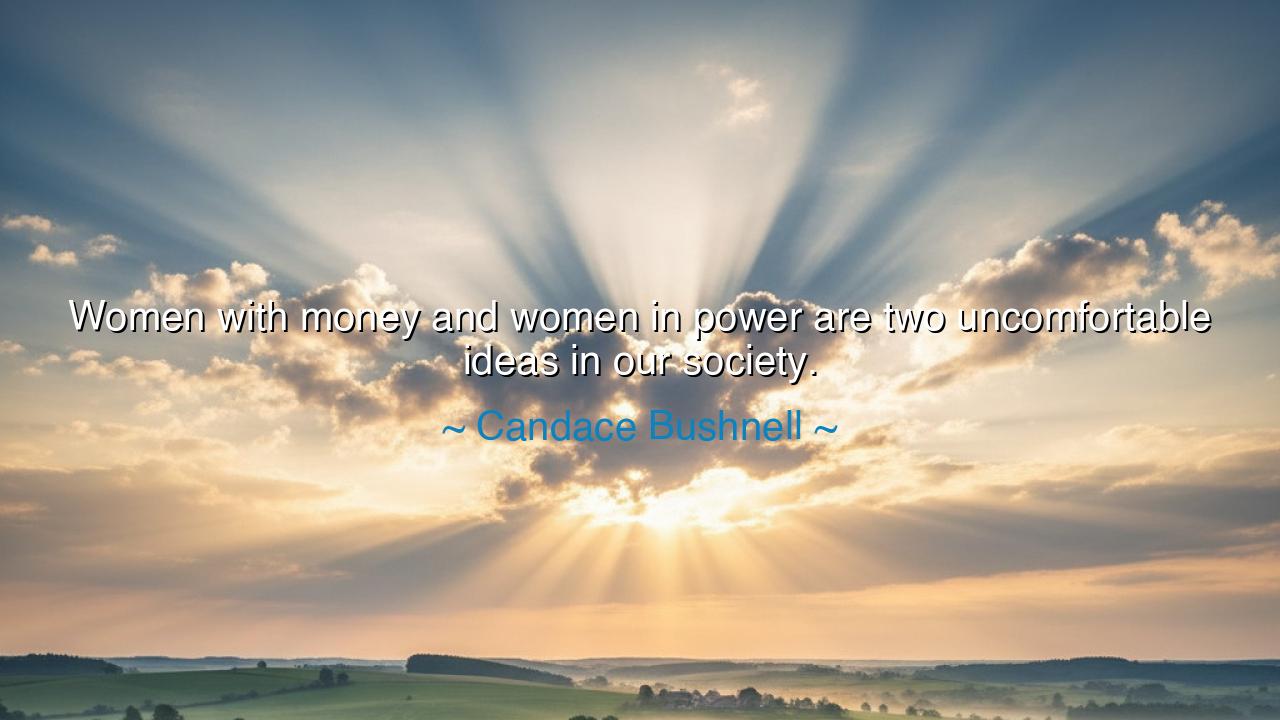
Women with money and women in power are two uncomfortable ideas






Hear the words of Candace Bushnell, sharp as an arrow and heavy with truth: “Women with money and women in power are two uncomfortable ideas in our society.” These words are not born of idle reflection but of centuries of struggle, for the place of women has long been confined by walls built of custom, law, and fear. Wealth and authority were long declared to be the domain of men, while women were taught to be dependents, their value measured by obedience, beauty, or silence. Thus, when a woman dares to claim either money or power, she is met not with celebration but with suspicion, hostility, or scorn.
Why is this so? Because wealth and authority are not merely possessions; they are symbols of independence. A woman with money cannot be bought, a woman with power cannot be commanded. She becomes free to decide her path, to speak her mind, to shape her world. And in this freedom, she challenges the ancient order that sought to bind her. It is not the woman herself that causes discomfort, but the truth she reveals: that dependence was never natural, but enforced, and that equality threatens those who profit from inequality.
History bears witness to this tension. Recall Elizabeth I of England, who ruled without husband or child, wielding the full might of the crown. Her reign brought both glory and unease, for many of her contemporaries could not bear the thought of a woman commanding armies, steering nations, and holding her own against kings. They tried to diminish her as the “Virgin Queen,” as though her refusal to submit to a man must be cloaked in purity. Yet Elizabeth endured, and her power reshaped an empire. Her story proves Bushnell’s words: women in power unsettle society, but they also reveal its untapped strength.
Consider, too, the rise of women in modern business. A woman with money, earned by her own labor, is often met with resentment. Her wealth is seen as arrogance, her ambition as greed—while the same traits in men are praised as vision and success. Think of Madam C. J. Walker, the daughter of slaves, who became the first female self-made millionaire in America. She built her empire not by inheritance but by brilliance and determination. Yet even as she employed thousands and uplifted her community, her wealth was treated as an oddity, as though her prosperity defied nature itself.
Bushnell’s words, though they sting, are meant as a mirror. They force us to see how society still recoils when women break the old molds. A man of riches is admired; a woman of riches is suspect. A man of power is respected; a woman of power is feared or ridiculed. This discomfort is not a law of nature—it is the lingering shadow of patriarchy, the echo of centuries in which women were denied their rightful place at the table of wealth and authority.
The lesson is clear: if society is to be whole, it must learn to welcome women not as guests in the halls of money and power, but as rightful co-builders of those halls. True strength is not threatened by equality; it is completed by it. To cling to the old discomfort is to cling to weakness, for a nation that silences half its people robs itself of half its genius.
What, then, must we do? First, confront our own prejudices: do we measure women by a harsher scale than men? Do we excuse power in one while condemning it in another? Second, raise up examples of women who have built, led, and thrived—not as exceptions, but as proof of what is possible for all. Third, encourage our daughters to see money not as taboo and power not as unfeminine, but as tools of freedom, responsibility, and justice. For only then will Bushnell’s words lose their sting, and the “uncomfortable ideas” will become the normal pillars of a just and flourishing society.
Thus remember: women with money and women in power are not threats to order, but promises of renewal. Their rise is not the fall of men, but the rise of humanity. To honor them is to honor the fullness of what civilisation can be, and to resist them is to keep the world half-blind, stumbling in shadows when it could walk boldly into the light.






AAdministratorAdministrator
Welcome, honored guests. Please leave a comment, we will respond soon